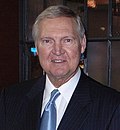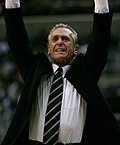Coaches
Note: Statistics are correct through the 2024–25 season.
NBL
| # | Name | Term [b] | GC | W | L | Win% | GC | W | L | Win% | Achievements | Reference |
|---|---|---|---|---|---|---|---|---|---|---|---|---|
| Regular season | Playoffs | |||||||||||
| Detroit Gems | ||||||||||||
| 1 | Joel Mason | 1946–1947 | 16 | 3 | 13 | .188 | — | — | — | — | [13] | |
| 2 | Fred Campbell | 1947 | 28 | 1 | 27 | .004 | — | — | — | — | [13] | |
| Minneapolis Lakers | ||||||||||||
| 3 | John Kundla *† | 1947–1948 | 60 | 43 | 17 | .717 | 10 | 8 | 2 | .800 | 1 Championship (1948) 1 WPBT championship (1948) | [13] |
BAA/NBA
| # | Name | Term [b] | GC | W | L | Win% | GC | W | L | Win% | Achievements | Reference |
|---|---|---|---|---|---|---|---|---|---|---|---|---|
| Regular season | Playoffs | |||||||||||
| Minneapolis Lakers | ||||||||||||
| 1 | John Kundla *† | 1948–1957 | 653 | 390 | 263 | .597 | 82 | 54 | 28 | .659 | 5 Championships (1949, 1950, 1952, 1953, 1954) [7] One of the top 10 coaches in NBA history [14] | [9] |
| 2 | George Mikan * | 1957–1958 | 39 | 9 | 30 | .231 | — | — | — | — | [15] | |
| — | John Kundla *† | 1958–1959 | 72 | 33 | 39 | .458 | 13 | 6 | 7 | .462 | One of the top 10 coaches in NBA history [14] | [9] |
| 3 | John Castellani * | 1959–1960 | 36 | 11 | 25 | .306 | — | — | — | — | [16] | |
| 4 | Jim Pollard | 1960 | 39 | 14 | 25 | .359 | 9 | 5 | 4 | .556 | [17] | |
| Los Angeles Lakers | ||||||||||||
| 5 | Fred Schaus * | 1960–1967 | 560 | 315 | 245 | .563 | 71 | 33 | 38 | .465 | [18] | |
| 6 | Butch van Breda Kolff | 1967–1969 | 164 | 107 | 57 | .652 | 33 | 21 | 12 | .636 | [19] | |
| 7 | Joe Mullaney | 1969–1971 | 164 | 94 | 70 | .573 | 30 | 16 | 14 | .533 | [20] | |
| 8 | Bill Sharman † | 1971–1976 | 410 | 246 | 164 | .600 | 37 | 22 | 15 | .595 | 1971–72 NBA Coach of the Year [8] 1 Championship (1972) [7] | [10] |
| 9 | Jerry West * | 1976–1979 | 246 | 145 | 101 | .589 | 22 | 8 | 14 | .364 | [21] | |
| 10 | Jack McKinney | 1979 | 14 | 10 | 4 | .714 | — | — | — | — | [22] | |
| 11 | Paul Westhead | 1979–1981 | 161 | 111 | 50 | .689 | 19 | 13 | 6 | .684 | 1 Championship (1980) [7] | [23] |
| 12 | Pat Riley | 1981–1990 | 727 | 533 | 194 | .733 | 149 | 102 | 47 | .685 | 1989–90 NBA Coach of the Year [8] 4 Championships (1982, 1985, 1987, 1988) [7] One of the top 10 coaches in NBA history [14] | [11] |
| 13 | Mike Dunleavy | 1990–1992 | 164 | 101 | 63 | .616 | 23 | 13 | 10 | .565 | McDonald's Open winner (1991) | [24] |
| 14 | Randy Pfund * | 1992–1994 | 146 | 66 | 80 | .452 | 5 | 2 | 3 | .400 | [25] | |
| 15 | Bill Bertka * | 1994 | 2 | 1 | 1 | .500 | — | — | — | — | [26] | |
| 16 | Magic Johnson * | 1994 | 16 | 5 | 11 | .313 | — | — | — | — | [27] | |
| 17 | Del Harris | 1994–1999 | 340 | 224 | 116 | .659 | 36 | 17 | 19 | .472 | 1994–95 NBA Coach of the Year [8] | [28] |
| — | Bill Bertka * | 1999 | 1 | 1 | 0 | 1.000 | — | — | — | — | [26] | |
| 18 | Kurt Rambis | 1999 | 37 | 24 | 13 | .649 | 8 | 3 | 5 | .375 | [29] | |
| 19 | Phil Jackson | 1999–2004 | 410 | 287 | 123 | .700 | 92 | 64 | 28 | .696 | 3 Championships (2000, 2001, 2002) [7] One of the top 10 coaches in NBA history [14] | [12] |
| 20 | Rudy Tomjanovich | 2004–2005 | 43 | 24 | 19 | .558 | — | — | — | — | [30] | |
| 21 | Frank Hamblen | 2005 | 39 | 10 | 29 | .256 | — | — | — | — | [31] | |
| — | Phil Jackson | 2005–2011 | 492 | 323 | 169 | .657 | 89 | 54 | 35 | .607 | 2 Championships (2009, 2010) [7] One of the top 10 coaches in NBA history [14] | [12] |
| 22 | Mike Brown | 2011–2012 | 71 | 42 | 29 | .591 | 12 | 5 | 7 | .417 | [32] | |
| 23 | Bernie Bickerstaff | 2012 | 5 | 4 | 1 | .800 | — | — | — | — | [33] | |
| 24 | Mike D'Antoni | 2012–2014 | 154 | 67 | 87 | .435 | 4 | 0 | 4 | .000 | [34] | |
| 25 | Byron Scott | 2014–2016 | 164 | 38 | 126 | .227 | — | — | — | — | [35] | |
| 26 | Luke Walton | 2016–2019 | 246 | 98 | 148 | .398 | — | — | — | — | [36] | |
| 27 | Frank Vogel | 2019–2022 | 225 | 127 | 98 | .564 | 27 | 18 | 9 | .667 | 1 Championship (2020) [7] | [37] |
| 28 | Darvin Ham | 2022–2024 | 164 | 90 | 74 | .549 | 16 | 9 | 12 | .429 | 1 NBA Cup (2023) | [38] |
| 29 | JJ Redick | 2024–present | 82 | 50 | 32 | .610 | 5 | 1 | 4 | .200 | [39] | |
- Former head coach Bill Sharman led the team to the NBA Championship in 1972.
- Jerry West was head coach of the Lakers for three seasons.
- Pat Riley coached the team to four championships in the 1980s.
- Phil Jackson won five championships in two stints coached with the Lakers.
- Former head coach Luke Walton.
- Frank Vogel coached the team to an NBA Championship in 2020





